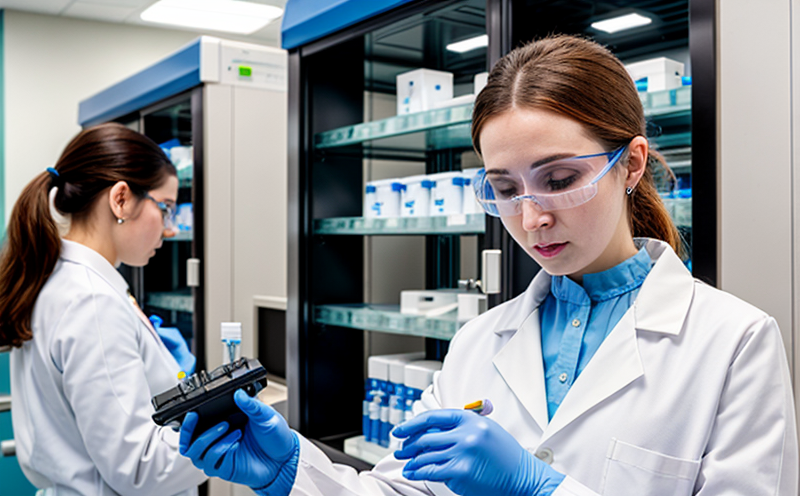Endogenous Compound Bioanalysis Testing
In the realm of pharmaceutical testing, bioanalytical methods hold a pivotal role in ensuring drug safety and efficacy. Endogenous compound bioanalysis is one such crucial aspect that helps identify, quantify, and qualify endogenous compounds within biological matrices to understand their impact on human health.
The term "endogenous" refers to substances naturally produced by the body, which can include hormones, neurotransmitters, and other signaling molecules. In pharmaceutical research, it is essential to analyze these compounds because they may interact with drug candidates, affecting pharmacokinetics or toxicity profiles. For instance, a drug designed to target an endocrine pathway might inadvertently alter hormone levels, leading to adverse effects.
Endogenous compound bioanalysis testing typically involves several key steps: sample collection, extraction, purification, and finally, quantification using advanced analytical techniques such as liquid chromatography-tandem mass spectrometry (LC-MS/MS). The goal is not only to detect the presence of these compounds but also to understand their concentration levels over time. This data provides valuable insights into potential off-target effects or drug-drug interactions.
One of the primary challenges in endogenous compound bioanalysis lies in achieving high specificity and sensitivity, especially when dealing with low concentrations of target analytes against a complex matrix background. To address this challenge, laboratories employ validated methods compliant with international standards like ISO 17025 for proficiency testing and ICH Q2 (R1) guidelines for method validation.
Another critical consideration is the stability of endogenous compounds during sample handling and storage. Proper temperature control and optimized extraction protocols are crucial to maintain integrity throughout the analytical process. Additionally, cross-reactivity between different analytes must be minimized through careful selection of reagents and chromatographic columns.
Real-World Applications
In clinical trials, endogenous compound bioanalysis plays a vital role in monitoring patient safety by detecting any unintended changes caused by the investigational drug. For example, if a new antidepressant is being tested, it would be necessary to track serotonin levels since imbalances could indicate side effects.
- Sample Types: Serum, plasma, urine
- Target Analytes: Glucocorticoids, catecholamines
- Instrumentation Used: LC-MS/MS, GC-MS
The findings from these analyses contribute significantly to regulatory submissions and inform dose adjustments or additional studies. Moreover, understanding endogenous compound behavior helps in designing more effective drugs tailored specifically for individual patients based on their unique physiological states.
Why It Matters
Understanding the interaction between exogenously introduced pharmaceuticals and endogenous compounds is fundamental to ensuring safe and efficacious drug development. By providing robust bioanalytical support, we help pharma companies navigate complex regulatory landscapes while fostering innovation in therapeutic areas.
The significance of this service extends beyond mere compliance; it supports scientific discovery by offering detailed insight into how drugs affect the body at a molecular level. This knowledge can guide optimization efforts aimed at reducing adverse reactions or enhancing treatment efficacy.
Furthermore, reliable endogenous compound bioanalysis contributes to improved patient outcomes through better-informed decisions regarding dosing regimens and personalized medicine strategies. It ensures that novel therapies meet stringent quality standards before reaching market approval stages.
Quality and Reliability Assurance
- Method Validation: Ensures the accuracy, precision, linearity, specificity, and robustness of bioanalytical assays. Compliance with ICH Q2 (R1) guidelines guarantees that methods are fit for purpose.
- Proficiency Testing: Participating in external quality assessment programs ensures continuous improvement and adherence to best practices within the industry. Adherence to ISO 17025 standards demonstrates our commitment to delivering high-quality results consistently across all projects.
- Data Integrity: Maintaining accurate records of all analytical data supports reproducibility and traceability, essential components in regulatory submissions.
Customer Impact and Satisfaction
Our clients benefit from comprehensive bioanalytical services that meet rigorous quality standards. This allows them to focus on their core competencies while relying on us for dependable analytical support.
We strive to exceed expectations by delivering timely, accurate results accompanied by detailed reports tailored specifically to each client’s needs. Our experienced team leverages state-of-the-art technologies and methodologies to ensure precision and reliability in every analysis performed.
Customer satisfaction is paramount, and we actively seek feedback to continually improve our services. Regular follow-ups with clients post-project provide opportunities for further collaboration and refinement of analytical approaches based on evolving industry trends and regulatory requirements.





